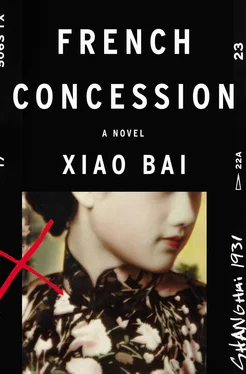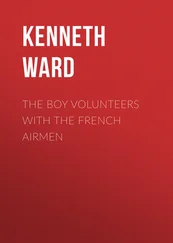A rickshaw broke out of the lineup, cutting off Leng’s sedan. Its window was open. Leng rolled her window down and stuck her head out. She poked her finger down her throat, and began to throw up the milk she had had for breakfast on the ship. The car stopped abruptly, her head jerked, and vomit spattered onto the body of the car. She did not see Ko Ya-min waiting behind the rickshaw. The door to the car was yanked open, and she fell out onto the ground. The gunfire pierced her eardrums like a screwdriver.
Firecrackers were echoing all along the tall buildings on either side of the wharf. But Ku had no time to enjoy the spectacle — he was focused only on witnessing its effect. As he watched Leng fall out of the car, he thought he could imagine how she must feel.
When it was eventually decided that Ko Ya-min would be the assassin instead of Leng, no one breathed a sigh of relief for her. Leng had argued that she was every bit as brave as Ko Ya-min, and the cell believed this man, Ts’ao Chen-wu, had in all likelihood ordered the murder of her ex-husband in prison. Ts’ao had been an officer in the Kwangsi Army, and he was now head of the Military Justice Unit for the forces occupying Shanghai. But Ku chose Ko as the assassin. His priority was to make sure that Ts’ao’s execution took place in public, in a highly visible location. Luckily he had not planned to have Ts’ao shot on the floating dock itself, or the police blockade of the jetty would have thwarted his plan. Ku knew why Ko Ya-min had fought so hard for this task. Wang Yang, the man who had been shot in prison on Ts’ao’s orders, was not only his half-brother and mentor, but also the person who had definitively conquered Leng’s heart, especially now that he was dead.
Ko reached his hand into the backseat of the car to fire. All three bullets hit Ts’ao, and the last one penetrated his temple.
For Ts’ao, that bullet was the final blow. But for Ku, it was only the first blow, the first of a series of powerful signals he planned to send to the Concession and to Shanghai.
The Concession Police stood by. Later, at a meeting to discuss the incident, they would say that everything happened too quickly for them to react.
The eight bodyguards sent by the Green Gang were also caught by surprise. They had just gotten into the other two cars in the motorcade. Just as an audience relaxes for a moment when the curtain falls and before the applause begins, they let their guard down as they settled into the car, and the assassin had seized his chance.
An investigative commission representing the Nanking government in Shanghai also began to look into the incident. In one of their internal meetings, someone suggested that there was something fishy about the fact that the police had demanded Ts’ao’s bodyguards hand over their rifles. Others suggested an investigation into the Green Gang bodyguards — who else could have known when Ts’ao was due to disembark, and how was this information leaked to the assassin? But all these speculations petered out when they discovered that Ts’ao’s wife had sent a telegram from Wu-sung-k’ou when the liner was anchored there. Investigations into her quickly revealed one startling piece of evidence after another: her unusual background, the telegrams she had sent to Shanghai from Hong Kong, her red head scarf, and the vomiting. The woman herself had disappeared. Her photograph appeared in all the newspapers, and the Concession tabloids made a big show of using many question marks to suggest something scurrilous had happened.
Someone brought in the form that the man who collected Leng’s telegram had filled out at the Telegraph Office, but they could not identify him, and the trail went cold. The tabloid reporter called Li Pao-i was a more promising lead, but there was little Nanking could do about that. As a resident of the French Concession, the man lay within the jurisdiction of the Concession Police, and the interrogation reports they sent to Nanking had clearly been doctored. One Sergeant Ch’eng from North Gate Police Station had written a report stating that Li had nothing to do with the assassins, and that Li had simply received an anonymous phone call at the newspaper’s editorial offices, as well as a brown paper envelope that afternoon after the incident took place. But Li had connections to the Green Gang and was known for his cunning. He had tipped off several other newspapers, and sold his story and the contents of the envelope to several of the most reputable newspapers in the Concession instead of printing them in his own small paper, so he wasn’t technically in breach of press regulations. No one in Nanking gave much thought to this setback, as they were already in the process of making plans to cooperate with the Concession Police.
And neither Nanking, nor the Concession Police, nor even the Green Gang could get anything out of the assassin, because after firing three shots at Ts’ao, he aimed the gun at his own temple and fired. The police coroner later found that the man had also bitten through a wax cyanide pill under his tongue. The bullet was just a safety measure.
MAY 25, YEAR 20 OF THE REPUBLIC.
9:10 A.M.

The Morris Teahouse was decorated like the interior of a ship’s cabin. This was not unusual in the foreign concessions, where middle-aged European businessmen liked to install portholes and ship wheels in their houses, and style themselves captains. To be more precise, the teahouse looked like a floating hexagonal pagoda with its narrow stairs and copper-plated railings. The third floor had large windows on three of its walls, through which the Race Course could be seen, northeast of the teahouse.
The teahouse was as raucous as a stable. In fact, the building had housed a stable before being converted to a teahouse. Two large pieces of iron shaped like horses’ hooves hung on the door, and Li Pao-i touched them every time he went inside.
The Morris Teahouse was where all the smalltime journalists in the concessions met to trade tips because it was so near the Race Course. On a clear day, if you stood at one of the windows facing north, you could see all the way to the ticket booth and even make out the colorful numbers announcing a raffle or listing betting odds. The crowds waited by the entrance, milling about in threes or fives. Li looked out onto the racecourse. On the inner dirt track where the horses warmed up in the morning, a stable hand was taking a small black mare for a lazy walk. When nuggets of horse shit dropped from her round ass, the stable hand would snatch them up as though they were worth something and put them in his bamboo basket.
Pppft! Li spat tea leaves out of the corner of his mouth. Even the tea here tasted like horse piss. The previous Saturday, the North Gate police had barged into his room early in the morning. Li lived in a tiny room above the shared kitchen, which meant his room always stank of fried salted fish. He was still half asleep when they dragged him outside and shoved him into the dingy backseat of a car. And then they dragged him out of the car and threw him into a room with white walls. It was true he could lock the door at night. But why should he? It wasn’t as though he owned anything valuable. And how had they burst into the courtyard and marched straight through the kitchen and up the squeaky wooden stairs, all without waking meddlesome Mrs. Yang downstairs? Granted, they were cops, unstoppable in their uniforms, with whistles and batons, and police badges on their lapels.
That was why he had slept soundly right up until the moment when his visitors pulled the covers off and asked him politely to get dressed. The car made several sharp turns and pulled up in front of a red brick building. Only when he was pushed roughly out of the car did he think to ask: who are you anyway?
Читать дальше













